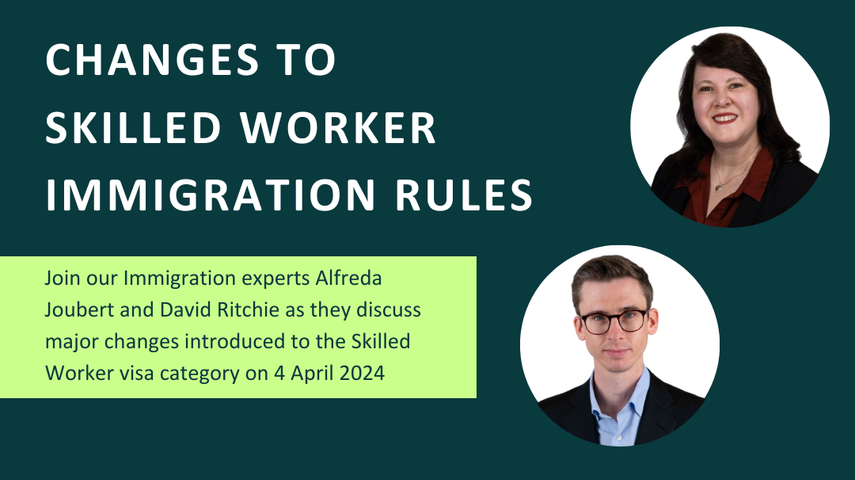Changes to Skilled Worker Immigration Rules

Changes to Skilled Worker Immigration Rules
Alfreda: Hi everyone, welcome to the Doyle Clayton Business Immigration podcast. My name is Alfreda Joubert and I’m a Partner in the Business Immigration team, I’m joined by David Ritchie, a Senior Associate in our team.
We are here today to discuss major changes that were introduced to the Skilled Worker Immigration Rules on 4th April 2024.
The changes are the biggest shake up to the points-based immigration system since Brexit, and is part of the government’s five-point plan to reduce net migration to the UK, which in their view has become too high.
David, will you talk us through the key changes?
David: Thanks Alfreda. The headline change in the new rules is a substantial increase to the minimum salary required to sponsor Skilled Workers, businesses will now need to pay a general minimum salary of at least £38,700 per year, which is a substantial increase from the previous threshold of £26,200.
But that’s not the end of the story, because they will also need to ensure the salary is above the “going rate” based on the Occupation Code for the worker’s role. And the way going rates are now calculated means huge increases compared to the old rules, going rates are generally now higher than the general £38,700 threshold.
Under the old rules, going rates were calculated using Office for National Statistics (ONS) data for 2010 salary levels at the 25th percentile, so lower than average levels typically paid at that time. The new rules require sponsors to pay Skilled Workers at least the median salary level, so the 50th percentile, based on 2020 data, which represents a big jump.
For example, a Business Analyst would have required a minimum salary of £32,000 under the old rules, but from 4th April onwards, this has increased to £48,000, a 50 percent hike.
Alfreda: Wow, that’s a very substantial increase, are there any exemptions or discounts that businesses can benefit from?
David: Some, yes. Going rate discounts of 10 or 20 percent apply to workers who hold a PhD in an area relevant to their role or in a STEM subject.
Those who are new entrants to the labour market benefit from a 30% discount on the going rate, but must also be paid at least £30,960 per year, an increase of £10,000 compared to the old rules.
To qualify as a New Entrant, the worker must broadly be either a recent graduate or under the age of 26. They can only be sponsored as New Entrants for a maximum total period of 4 years, so employers will need to ensure salaries reach the full going rate before the end of this period or the person will not be able to extend their visa.
Alfreda: Under the old immigration rules, there was a shortage occupation list which allowed businesses to pay a lower salary to workers sponsored for roles in which there were skills shortages, is this still the case under the new rules?
David: Yes and no! The government has replaced the shortage occupation list with a so-called ‘Immigration Salary List’, which is much shorter, and has removed the 20% going rate discount. Although the general salary threshold for these roles is lower, £30,960 rather than £38,700, this is of very limited benefit because the full going rate must still be paid.
Alfreda: Can you give an example David?
David: Let’s look at the role of Software Engineer, which has been on the shortage occupation list for several years. Pre 4th April, a Software Engineer would need to be paid a minimum salary of £27,200 (which includes the 20% shortage occupation discount), however under the new rules, this jumps massively to £49,400 per year.
Alfreda: Wow, another very substantial increase. What about Skilled Worker visas that were granted under the old rules that will be extending post 4 April?
David: There are transitional provisions that apply, but the salary thresholds will be different again, broadly at least £29,000 per year or going rates pitched at the 25th percentile of current salary levels. This represents an increase, but a less steep one than for new hires applying for Skilled Worker permission for the first time.
Alfreda: So it’s very important that businesses will need to be aware of these different salary thresholds to ensure workers are able to extend before their current visas expire. Are there any positive developments in the new immigration rules?
David: Yes, one piece of good news is the expansion of the rules regarding supplementary work Skilled Workers are allowed to do. Skilled Workers may now work outside of the core working hours of their main sponsored role, as long as the ‘supplementary work’ meets the minimum skill level of RQF level 3, that’s A-level or above, and is limited to a maximum of 20 hours per week. Under the old rules, this was more restricted as workers could only do supplementary work if it came within the scope of the same Occupation Code as their sponsored role or was on the shortage occupation list. So we might now see Skilled Workers take more supplementary employment as they have the right to work in a broader capacity.
Alfreda: Some positive news at least! Thanks for that helpful summary, David, the key takeaway seems to be that sponsor licence holders should be checking their lists of current Skilled Workers, as well as any applications for new hires in the pipeline to ensure the new salary thresholds are met. They should also be thinking about any discounts that could potentially apply, whilst being aware of their limitations.
This now brings us to the end of our podcast, we hope you found it helpful. If you have any questions or require assistance with audit tasks, HR and recruiter training and assessing whether applicants meet the requirements of the new rules, please get in touch with the Doyle Clayton Business Immigration Team, have a good day.
Alfreda Joubert
Alfreda has gained a wealth of knowledge during her 22 years in the field of immigration and she has been recognised by The Legal 500 as a leading expert in both corporate and private immigration.
- Partner
- T: +44 (0)20 7778 7249
- Email me
David Ritchie
Based in the City office, David is an experienced immigration lawyer advising both organisations and individuals
- Senior Associate
- T: +44 (0)20 7778 7227
- Email me
The articles published on this website, current at the date of publication, are for reference purposes only. They do not constitute legal advice and should not be relied upon as such. Specific legal advice about your own circumstances should always be sought separately before taking any action.


